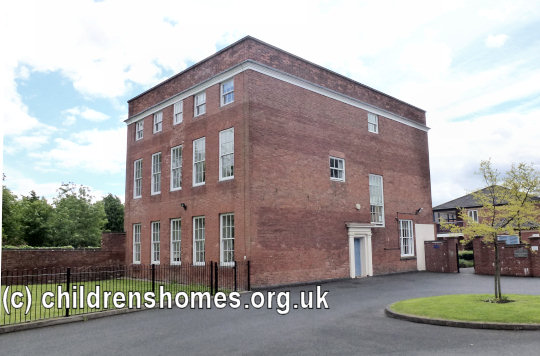Witton Hall Industrial School for Boys, Birmingham, Warwickshire
In 1902, the boys' Industrial School at Penn Street, Deritend moved out from its cramped buildings in central Birmingham to Witton, about four miles to the north of the city. Its new location, set in six acres of grounds, was an old house called Witton Hall, on George Road, which was altered and extended for the purpose. On June 13th, 1902, the premises were formally certified to begin operation, with accommodation for up to 80 boys. Most of the existing staff appear to have moved with the School to Witton, including the superintendent and matron, Mr and Mrs E.A. Francis, and the head schoolmaster, Mr A. Miller. From 1903, however, annual reports record the superintendent and matron as being Mr and Mrs G.A. Francis.
According to the 1903 inspection report, the move to the country from the town effected a transformation on the School. The new premises were described as roomy, light, airy and homelike.
As at Penn Street, the industrial training provided for the boys included tailoring and shoemaking. A manual instruction class, teaching basic carpentry, was now introduced, with the most proficient boys progressing to do practical joinery. There 1½ acres of garden land and orchard at Witton Hall also offered good employment for some of the boys. The drum and fife band had 21 performers and a bugle band was started. In the schoolroom, drawing was added to the list of subjects taught. Drill with free gymnastic exercises was carried on daily by the head schoolmaster. A playing-field with a cricket pitch was laid out and the school joined the Midland Home Office District League, played some matches, both at football and cricket, with very fair success.
Despite the blossoming of the School that took place after its move to Witton Hall, the falling numbers of boys being placed there by magistrates (just 51 inmates resident in 1905) meant that it quickly became uneconomic to run. Accordingly, the School resigned its certificate as of June 14th, 1905, and was then closed.
In 1907, Witton Hall was purchased by the Aston Board of Guardians, initially for use as a short-term home for 120 children of 'ins-and-outs'. It was later used by the union as a home for the elderly and infirm. In more recent times, the site has been redeveloped for private residential use, with just the original main building of the Hall surviving.

Former Witton Hall Industrial School for Boys, Birmingham, 2013. © Peter Higginbotham
Records
Note: many repositories impose a closure period of up to 100 years for records identifying individuals. Before travelling a long distance, always check that the records you want to consult will be available.
- Birmingham Archives and Heritage Service, Library of Birmingham, Centenary Square, Broad Street, Birmingham B1 2ND. Holdings (for both Penn Street and Witton) comprise: Admission register (1882-1905); Discharge register (1899-1905); Agreement for admission of boys committed from Worcestershire (1901).
Bibliography
- Higginbotham, Peter Children's Homes: A History of Institutional Care for Britain's Young (2017, Pen & Sword)
- Mahood, Linda Policing Gender, Class and Family: Britain, 1850-1940 (1995, Univeristy of Alberta Press)
- Prahms, Wendy Newcastle Ragged and Industrial School (2006, The History Press)
Links
- None noted at present.
Except where indicated, this page () © Peter Higginbotham. Contents may not be reproduced without permission.


